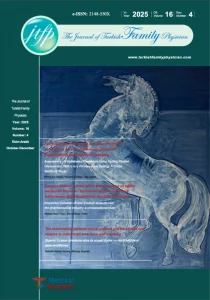How Person With Diabetes Should Be Monitored?
It is necessary to monitor the diabetic person efficiently for surviving his life as a healthy person. This monitoring consists of both self-monitoring and health professional’s monitoring. Person should be taken a necessary education from health professionals for having abilities about self-monitoring and self-care. In this article, current approaches about how will perform a comprehensive evaluation and monitoring of the diabetic person is presented.
References
- Olgun N, Eti Aslan F, Coşansu G, Çelik S. Diabetes mellitus. “Dahili ve Cerrahi Hastalıklarda Bakım” içinde. (ed) Karadakovan A, Aslan FE, 2. baskı, Adana, Nobel Tıp Kitabevi, 2011;817-56.
- American Diabetes Association: Standards of medical care in diabetes-2011. Diabetes Care, 2011; 34 (1):11-61.
- Olgun, N. Kendi kendini izleme. “Diyabet Hemşireliği Temel Bilgiler” içinde. (ed). Erdoğan SW, İstanbul, Yüce Reklam/ Yayım/ Dağıtım A.Ş, 2002; a: 67-80.
- Türkiye Endokrinoloji ve Metabolizma Derneği (TEMD): Diabetes Mellitus Çalışma ve Eğitim Grupları 2009. Diabetes Mellitus ve Komplikasyonlarının Tanı Tedavi ve İzlem Klavuzu. 4. Baskı, İstanbul, Bayt Bilimsel Araştırmalar Basın Yayın ve Tanıtım Ltd. Şti., 2009.
- The Diabetes Control and Complications Trial (DCCT)Research Group. The effect of intensive treatment of diabetes on the development and progression of long-term complications in insulin dependent diabetes mellitus. N Engl J Med 1993; 329: 977-86.
- United Kingdom Prospective Diabetes Study (UKPDS) Group. Intensive blood glucose control with sulphonylureas or insulin compared with conventional treatment and risk of complications in patients with type 2 diabetes (UKPDS 33). Lancet 1998; 352: 837-53.
- The ADVANCE Collaborative Group. Intensive blood glucose control and vascular outcomes in patients with type 2 diabetes. New Engl J Med. 2008; 358: 2560-72.
- Nathan DM, Buse JB, Davidson MB, Heine RJ, Holman RR, Sherwin R, Zinman B. Management of hyperglycemia in type 2 diabetes: A consensus statement from the ADA and EASD. Diabetes Care 2008; 31(1): 173-175.
- Bennet PH, Knowler WC. Definition, Diagnosis and Classification of Diabetes Mellitus and Glucose Homeostaisis. In: “Joslin Diabetes Mellitus” (eds). Kahn CR, Weir GC, King GL, Jacobson AM, Moses AC, Smith RJ, 14th ed. Philadelphia, Lippincott Williams &Wilkins, 2005; 331-39.
- International Diabetes Federation Diabetes Atlas, 4th ed, 2009, http://www.diabetesatlas.org/ adresinden 10/08/2011 tarihinde erişilmiştir.
- Ohkubo Y, Kishikawa H, Araki E, Miyata T, Isami S, Motoyoshi S, Kojima Y, Furuyoshi N, Shichiri M. Intensive insulin therapy prevents the progression of diabetic microvascular complications in Japanese patients with non-insulin-dependent diabetes mellitus: a randomized prospective 6-year study. Diabetes Res Clin Pract 1995; 28: 103-17.
- Monnier L, Lapinski H, Colette C. Contributions of fasting and postprandial plasma glucose increments to the overall diurnal hyperglycemia of type 2 diabetic patients. Diabetes Care 2003; 26: 881-85.
- Woerle HHJ, Neumann C, Zschau S, Tenner S, Irsigler A, Schirra J, Gerich JE, Göke, B. Impact of fasting and postprandial glycemia on overall glycemic control in type 2 diabetes. Importance of postprandial glycemia to achieve target HbA1c levels. Diab Res Clin Pract 2007; 77: 280-85.
- Bektas F, Eray O, Sarı R, Akbaş H. Point of care blood ketone testing of diabetic patients in the emergency department. Endocr Res 2004; 30, 395–402.
- Olgun N. Hipoglisemi ve hiperglisemi. “Diyabet Hemşireliği Temel Bilgiler” içinde (ed) Erdoğan S, İstanbul, Yüce Reklam/ Yayım/ Dağıtım A.Ş, 2002b; 105- 116.
- Yüksel, A. (2002). Diyabette ayak bakımı. “Diyabet Hemşireliği Temel Bilgiler” içinde (ed). Erdoğan S, İstanbul, Yüce Reklam/ Yayım/ Dağıtım A.Ş, 2002; 163-182.
- Welch G, Garb J, Zagarins S, Lendel I, Gabbay RA. Nurse diabetes case management interventions and blood glucose control: Results of a meta-analysis. Diabetes Res Clin Pract, 2010; 88: 1-6.
- Diyabet Hemşireliği Derneği. Diyabet Eğitimcileri İçin Diyabet Ajandası, İstanbul, EOS Ajans, Yayıncılık, 2011.



